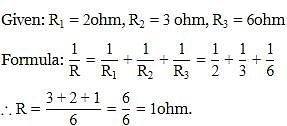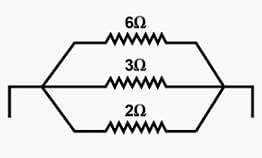Class 12 Exam > Class 12 Questions > Calculate equivalent resistance when three re...
Start Learning for Free
Calculate equivalent resistance when three resistances of 2 ohms, 3 ohms and 6 ohms are connected in parallel combination.
- a)2 Ω
- b)3 Ω
- c)1 Ω
- d)4 Ω
Correct answer is option 'C'. Can you explain this answer?
| FREE This question is part of | Download PDF Attempt this Test |
Verified Answer
Calculate equivalent resistance when three resistances of2ohms,3ohms a...


Most Upvoted Answer
Calculate equivalent resistance when three resistances of2ohms,3ohms a...
The equivalent resistance in a parallel resistance circuit can be calculated using the formula:
1/Req = 1/R1 + 1/R2 + 1/R3 + ...
where Req is the equivalent resistance and R1, R2, R3, ... are the individual resistances connected in parallel.
If the resistances are 2 Ω each, then the formula becomes:
1/Req = 1/2 + 1/2 + 1/2 + ...
Simplifying the equation:
1/Req = 1/2 * (1 + 1 + 1 + ...)
1/Req = 1/2 * n
where n is the number of resistances connected in parallel.
Therefore, the equivalent resistance (Req) when the resistances are 2 Ω each is:
Req = 2/n
1/Req = 1/R1 + 1/R2 + 1/R3 + ...
where Req is the equivalent resistance and R1, R2, R3, ... are the individual resistances connected in parallel.
If the resistances are 2 Ω each, then the formula becomes:
1/Req = 1/2 + 1/2 + 1/2 + ...
Simplifying the equation:
1/Req = 1/2 * (1 + 1 + 1 + ...)
1/Req = 1/2 * n
where n is the number of resistances connected in parallel.
Therefore, the equivalent resistance (Req) when the resistances are 2 Ω each is:
Req = 2/n
Free Test
FREE
| Start Free Test |
Community Answer
Calculate equivalent resistance when three resistances of2ohms,3ohms a...
The equivalent resistance in a parallel resistance circuit is given by the formula:
1/Req = 1/R1 + 1/R2 + 1/R3 + ...
Where R1, R2, R3, ... are the individual resistances in the circuit.
If the resistances are 2 Ω, the formula becomes:
1/Req = 1/2 + 1/2 + 1/2 + ...
Since all the resistances are the same, the equation simplifies to:
1/Req = n/2
Where n is the number of resistances in the circuit.
To find the equivalent resistance, we can rearrange the equation:
Req = 2/n
So, if there are 2 resistances in the circuit, the equivalent resistance would be:
Req = 2/2 = 1 Ω
1/Req = 1/R1 + 1/R2 + 1/R3 + ...
Where R1, R2, R3, ... are the individual resistances in the circuit.
If the resistances are 2 Ω, the formula becomes:
1/Req = 1/2 + 1/2 + 1/2 + ...
Since all the resistances are the same, the equation simplifies to:
1/Req = n/2
Where n is the number of resistances in the circuit.
To find the equivalent resistance, we can rearrange the equation:
Req = 2/n
So, if there are 2 resistances in the circuit, the equivalent resistance would be:
Req = 2/2 = 1 Ω

|
Explore Courses for Class 12 exam
|

|
Similar Class 12 Doubts
Calculate equivalent resistance when three resistances of2ohms,3ohms and6ohms are connected in parallel combination.a)2 Ωb)3 Ωc)1 Ωd)4 ΩCorrect answer is option 'C'. Can you explain this answer?
Question Description
Calculate equivalent resistance when three resistances of2ohms,3ohms and6ohms are connected in parallel combination.a)2 Ωb)3 Ωc)1 Ωd)4 ΩCorrect answer is option 'C'. Can you explain this answer? for Class 12 2024 is part of Class 12 preparation. The Question and answers have been prepared according to the Class 12 exam syllabus. Information about Calculate equivalent resistance when three resistances of2ohms,3ohms and6ohms are connected in parallel combination.a)2 Ωb)3 Ωc)1 Ωd)4 ΩCorrect answer is option 'C'. Can you explain this answer? covers all topics & solutions for Class 12 2024 Exam. Find important definitions, questions, meanings, examples, exercises and tests below for Calculate equivalent resistance when three resistances of2ohms,3ohms and6ohms are connected in parallel combination.a)2 Ωb)3 Ωc)1 Ωd)4 ΩCorrect answer is option 'C'. Can you explain this answer?.
Calculate equivalent resistance when three resistances of2ohms,3ohms and6ohms are connected in parallel combination.a)2 Ωb)3 Ωc)1 Ωd)4 ΩCorrect answer is option 'C'. Can you explain this answer? for Class 12 2024 is part of Class 12 preparation. The Question and answers have been prepared according to the Class 12 exam syllabus. Information about Calculate equivalent resistance when three resistances of2ohms,3ohms and6ohms are connected in parallel combination.a)2 Ωb)3 Ωc)1 Ωd)4 ΩCorrect answer is option 'C'. Can you explain this answer? covers all topics & solutions for Class 12 2024 Exam. Find important definitions, questions, meanings, examples, exercises and tests below for Calculate equivalent resistance when three resistances of2ohms,3ohms and6ohms are connected in parallel combination.a)2 Ωb)3 Ωc)1 Ωd)4 ΩCorrect answer is option 'C'. Can you explain this answer?.
Solutions for Calculate equivalent resistance when three resistances of2ohms,3ohms and6ohms are connected in parallel combination.a)2 Ωb)3 Ωc)1 Ωd)4 ΩCorrect answer is option 'C'. Can you explain this answer? in English & in Hindi are available as part of our courses for Class 12.
Download more important topics, notes, lectures and mock test series for Class 12 Exam by signing up for free.
Here you can find the meaning of Calculate equivalent resistance when three resistances of2ohms,3ohms and6ohms are connected in parallel combination.a)2 Ωb)3 Ωc)1 Ωd)4 ΩCorrect answer is option 'C'. Can you explain this answer? defined & explained in the simplest way possible. Besides giving the explanation of
Calculate equivalent resistance when three resistances of2ohms,3ohms and6ohms are connected in parallel combination.a)2 Ωb)3 Ωc)1 Ωd)4 ΩCorrect answer is option 'C'. Can you explain this answer?, a detailed solution for Calculate equivalent resistance when three resistances of2ohms,3ohms and6ohms are connected in parallel combination.a)2 Ωb)3 Ωc)1 Ωd)4 ΩCorrect answer is option 'C'. Can you explain this answer? has been provided alongside types of Calculate equivalent resistance when three resistances of2ohms,3ohms and6ohms are connected in parallel combination.a)2 Ωb)3 Ωc)1 Ωd)4 ΩCorrect answer is option 'C'. Can you explain this answer? theory, EduRev gives you an
ample number of questions to practice Calculate equivalent resistance when three resistances of2ohms,3ohms and6ohms are connected in parallel combination.a)2 Ωb)3 Ωc)1 Ωd)4 ΩCorrect answer is option 'C'. Can you explain this answer? tests, examples and also practice Class 12 tests.

|
Explore Courses for Class 12 exam
|

|
Signup for Free!
Signup to see your scores go up within 7 days! Learn & Practice with 1000+ FREE Notes, Videos & Tests.


















